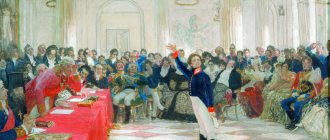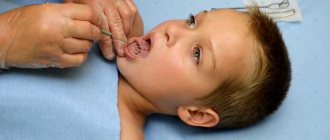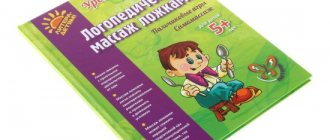Article:
A modern kindergarten deserves to be called an institution that is able to adequately assess the requests and needs of children and their parents.
The work of such kindergartens is aimed at correcting existing disorders and difficulties, as well as at continuous development. In recent years, requests from parents to support the educational process of children with speech development disorders have increased. A good preschool educational institution employs not only a music director and a physical education instructor, but also a teacher psychologist and a speech therapist. But unfortunately, the presence of good specialists does not always give a constant positive result in work. Therefore, a constant search for new forms of activity to provide speech therapy assistance is necessary.
For productive work on improving speech, high-quality diagnostics, individual and group correction, interaction with PMPK and the dissemination of knowledge among educators and teachers are necessary.
How does a speech therapy kindergarten differ from a regular kindergarten?
There is an opinion that a speech therapy group is a certain “stigma” in a child’s personal file. Is it really?
First, let's figure out what a speech therapy group is?
Correctional groups are divided into speech (speech therapy) and groups of children with mental retardation (delayed psycho-speech development).
In speech therapy groups, they introduce sounds that were not there and correct incorrectly pronounced ones (correction of speech defects), enrich the vocabulary, develop phonemic awareness, coherent speech, and teach correct grammatical formatting. In the senior and preparatory groups they prepare for learning to read and write.
In the ZPR groups there are both a speech therapist and a defectologist (in addition to teachers who have the necessary qualifications). Also, a speech center can work in a kindergarten - in this case, a speech therapist individually works with children with impaired pronunciation according to a certain schedule.
But in any case, a speech therapy group in our time is not a punishment, but, most likely, a reward, because it has become more difficult to get there, and the general underdevelopment of speech is easier to correct in the garden, where all the work is aimed at eliminating this problem.
Perhaps it is no longer a secret to anyone that in speech therapy kindergartens the preparation of children, no offense to anyone, is sometimes much stronger than in mass kindergartens. Because children from speech therapy groups come to school with a much better vocabulary than children from a regular kindergarten. They know more, they have a wider vocabulary, and many skills are better developed, starting with graphic skills, sound-letter analysis and ending with stories based on pictures. Generalizing concepts are better formed. That is, children come from speech therapy kindergartens even more prepared.
Some parents are very attracted by all this splendor, and they dream of enrolling their children in a speech kindergarten. Others are afraid of speech therapy kindergartens, believing that a child who finds himself among poorly speaking peers will begin to speak even worse than before.
These are misconceptions. A child with speech therapy problems does not begin to speak worse because he communicates with other children with similar disorders. The only exceptions are those cases when a child with pronunciation problems ends up in a group of children who stutter. Indeed, there are cases where a child develops stuttering “by imitation.” But specialists, as a rule, avoid such mistakes.
So, for one reason or another, you think that your child definitely needs a specialized speech therapy group. What do you need to do to get into a speech therapy garden?
The speech therapy kindergarten accepts children mainly 4-5 years of age, since correction of speech disorders is especially important for them in order to successfully prepare for school. From the age of 3 you can join a group for children with delayed psycho-speech development (DSD).
Speech therapy projects for preschoolers
Among all speech therapy events for preschoolers, speech therapy projects and a summer health campaign for children with speech disorders occupy special positions.
Speech therapy projects in preschool educational institutions
To more deeply and systematically improve work performance, special speech therapy projects are being developed for preschoolers. These projects are divided into categories:
- By duration of work: short-term and long-term.
- By type of activity: research, practice-oriented, creative, informational and gaming.
If there is work to be done on setting individual sounds or learning tongue twisters, then a short-term speech therapy project at a preschool educational institution is used. If there is work to be done on working on speech breathing or improving physical health, then it will be long-term, since this work must be carried out over a long time.
Each such project has a goal, objectives, expected results, the practical significance of the project, as well as its stages and implementation strategies.
The speech therapy project is developed taking into account the age of the children in the group, as well as based on the diagnostic results. Also, the speech therapy program is a project of a speech therapist teacher at a preschool educational institution, and a joint development of all teachers carrying out correctional work in the institution. But its main compiler is a speech therapist.
Note! Speech therapy paths are often used in correctional work. This is a technique that allows you to develop several areas: speech breathing, articulatory motor skills, and coherent speech. The student must follow each path from beginning to end.
Speech development in the younger group - norms for children's speech development by spring
What is a speech therapy camp for children?
A speech therapy camp is a health program for children that operates in the summer and provides activities for the correction and development of speech. Typically, such a camp employs a teacher, educational psychologist, speech therapist, physical education instructor, and sometimes an art teacher and theater teacher. The entire program is aimed at a comprehensive approach to the correction of speech disorders: starting with articulatory gymnastics and games for the perception of sounds, and ending with special nutrition.
Speech therapy camp for children with speech disorders
A speech therapy camp for children with speech disorders operates on the basis of a preschool educational institution or as an independent organization. The main purpose of such organization of time is to provide assistance to preschool children with speech disorders.
Such work in the summer shows the greatest effectiveness, since in addition to corrective classes with children, therapeutic exercise and self-massage are carried out for general muscle strengthening, healthy nutrition and long walks in the fresh air are organized. Usually, in a camp, all shifts have their own themes and classes are held in a playful, developmental form, therefore they find the greatest response from children and their legal representatives.
Note! Leisure activities are also organized for children, which help develop creative and physical abilities: visiting the swimming pool, theaters, and city festivals. In addition, to monitor effectiveness, speech therapy examinations of preschool children are carried out at the beginning and end of the shift.
What exactly needs to be done to get into a speech therapy garden?
The staffing of preschool educational institutions today is determined by Order of the Ministry of Education and Science of Russia dated April 8, 2014 No. 293 “On approval of the Procedure for admission to training in educational programs of preschool education.”
So, how to place a child in a speech therapy group in a kindergarten.
Step 1. Get in line for a place in kindergarten - this can be done through the State Services portal (electronic) or on the official website of the mayor of Moscow.
Step 2. Receive a referral from the district clinic to undergo a PMPK (psychological-medical-pedagogical commission). To do this, you will need to visit a pediatrician, neurologist and speech therapist.
Step 3. Collect the necessary documents for the PMPC (check the exact list at the PMPC at your place of residence).
Step 4. Make an appointment at the district PMPC - this can also be done through the State Services portal.
Step 5. On the appointed day, come for the examination with your child.
Description of the psychological, medical and pedagogical commission
PMPK is an abbreviation that stands for: psychological-medical-pedagogical commission (consilium, consultation). Her work is carried out to determine the mental and physical level of development of children in order to select the most suitable educational route.
When a child needs a special educational program, he is sent for examination to the PMPK. Psychologists, doctors and teachers who specialize in teaching children from early preschool to high school age participate in the study of the educational needs of children.
The speech therapy commission meets in one room. All specialists can sit at separate tables (the child takes turns talking to them) or together. They ask the child interesting questions and offer to do some tasks.
By examining the results of tasks and conversations, psychologists and teachers draw conclusions about the psychological specificity of intellectual activity, the degree of the child’s characteristics, and establish the prerequisites for the emergence of development and learning problems.
Unfortunately, children often find themselves surrounded by strange adults, in an uncomfortable environment. Members of the commission sometimes rush the child, do not take into account the specifics of temperament, do not encourage and do not give rest when completing tasks. An unfamiliar environment negatively affects preschoolers, especially if they have developmental disorders. Sometimes children become completely silent and do not show all their capabilities, and do not want to answer the commission’s questions.
Walkthrough
Most often they ask questions about logical thinking and intelligence. The child must repeat combinations of sounds to identify violations in the pronunciation of certain sounds. Feedback from parents shows that the conversation does not last long, 10-15 minutes, and the result is announced immediately.
Representatives may also ask:
- insert a figure into an identical figure (triangle into a triangle, circle into a circle, etc.);
- assemble a pyramid;
- name colors and shapes;
- collect body parts of a paper man;
- name all the seasons and the one that is now;
- find an extra item;
- answer the question of who the baby is to dad, grandma, etc.;
- answer spatial questions (where is the dog sitting?);
- describe what is shown in the picture;
- combine objects into groups according to a certain characteristic;
- say words like mezzanine, stir, etc. to check audio pronunciation;
- draw something;
- sing an excerpt from a song or recite a poem.
It is not advisable to prepare a child in advance for a commission to a speech therapy group, since the correctness of measures to eliminate violations depends on the accuracy of the diagnosis. There is no need to be afraid of any terrible diagnoses; for a speech therapy group, the following conclusions are essentially appropriate: general speech underdevelopment; phonetic-phonemic underdevelopment of speech; stuttering, or logoneurosis.
It is recommended not to refuse a speech therapy group, especially if there are speech disorders. Children then learn writing, counting, reading, and correct pronunciation of sounds. In addition, this is very profitable, since the cost of classes with a private speech therapist is from 500 rubles, but in the kindergarten they are free, homework is given.
The waiting list for a speech therapy commission in Moscow is approximately 1.5 months.
Composition of the commission
The speech therapy commission consists of the following members:
- the chairman is a specialist in the educational field;
- deputy – healthcare specialist;
- doctors of one or another specialization (ophthalmologist, orthopedist, pediatrician, otolaryngologist, etc.);
- psychologist;
- special teacher (oligophrenopedagogist, teacher of the deaf, speech therapist, defectologist, etc.);
- lawyer;
- social teacher, social worker.
To prevent the child from being frightened by unfamiliar surroundings and people, the commission may include temporary members - his class teacher, teacher, etc. Children are sent to PMPK only when their parents give consent.





